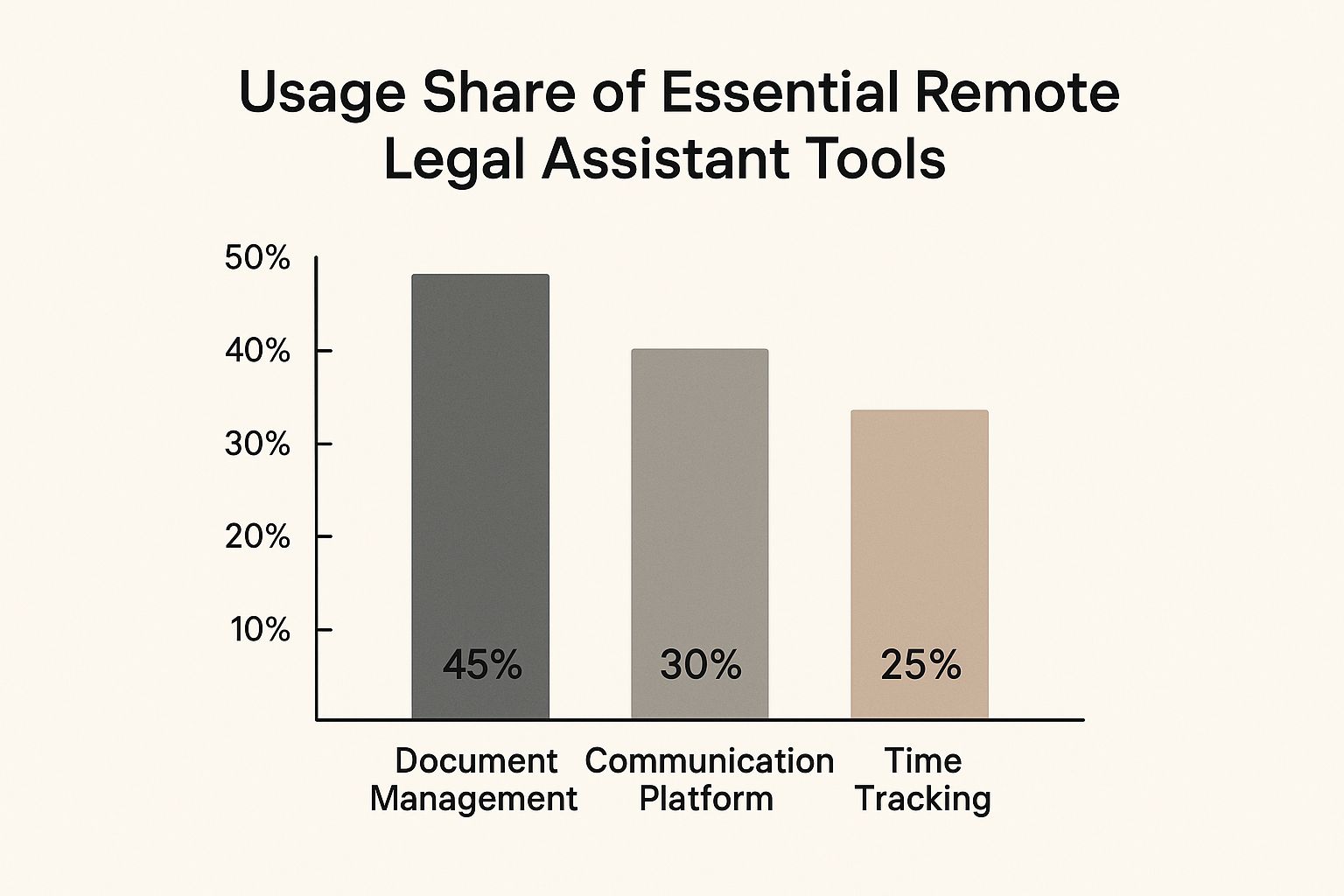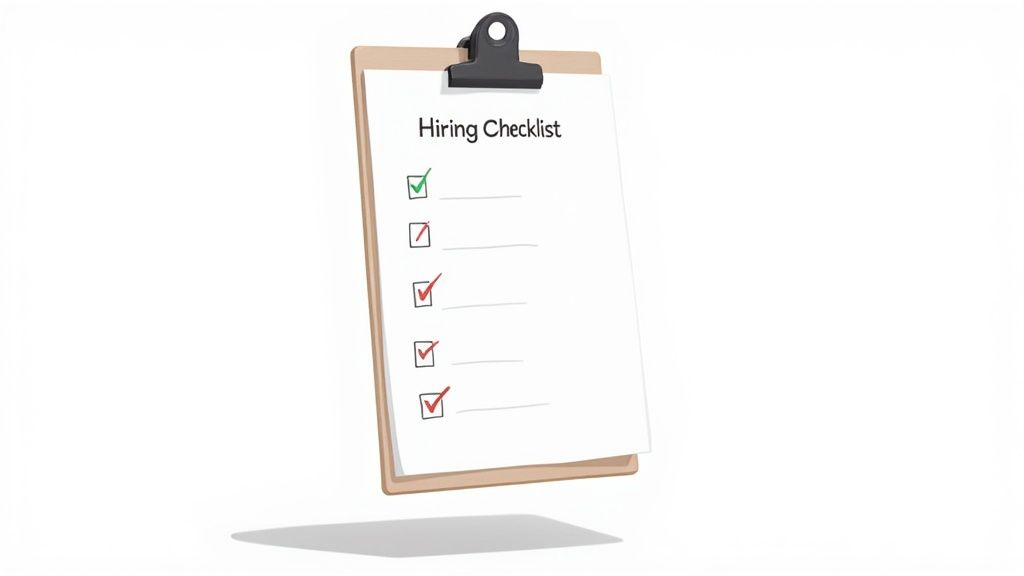
 20 minutes read
20 minutes read
You didn't survive law school and the bar exam to become a professional calendar-wrangler. Yet, for too many attorneys, that's the grim reality. Let's be blunt: every minute you spend on administrative BS is a minute you're not spending on billable strategy.
This is the hidden tax on your firm’s growth—the silent killer of profitability and, frankly, your sanity.
Let's get one thing straight: "busy" isn't a badge of honor. It's a sign you're stuck in the weeds, mistaking frantic activity for actual progress. As your firm's rainmaker, strategist, and lead counsel, you are, without a doubt, the most expensive administrative assistant on your own payroll.
Every time you personally schedule a deposition, chase an e-signature, or waste an hour formatting a pleading, you're making a choice. You're picking a $50-per-hour task over a $350-per-hour opportunity. It's a slow financial bleed that compounds daily until you look up and wonder why you’ve hit a wall.
That old "I'll just do it myself" mindset isn't just inefficient; it's a direct threat to your bottom line. You didn’t build a legal practice to spend your best hours on work someone else should be doing for a fraction of the cost.
Let's put some real numbers to this, because feelings don't pay the bills. When you, the lawyer, handle admin, the lost revenue adds up shockingly fast. See for yourself how delegating these soul-crushing tasks to a skilled remote legal assistant directly boosts your bottom line.
| Task | Time Spent by Lawyer (Weekly) | Lost Billable Revenue (@ $350/hr) | Cost to Delegate to Remote Assistant |
|---|---|---|---|
| Scheduling & Calendar Management | 2.5 hours | $875 | ~$75 |
| Client Intake & Follow-Up | 2 hours | $700 | ~$60 |
| Document Formatting & Filing | 1.5 hours | $525 | ~$45 |
| Email Management | 3 hours | $1,050 | ~$90 |
| Total Weekly Impact | 9 hours | $3,150 | ~$270 |
The math is brutal. Spending just nine hours a week on these tasks torches over $3,000 in lost revenue. Delegating that same work costs less than $300. You do the math.
The legal industry's move to remote work isn't new, but the pandemic kicked it into high gear, forcing firms to finally question the old-fashioned, office-bound model. Now, about 16% of companies globally are fully remote, and 62% of workers log in from home at least some of the time.
This isn't just a trend; it's a fundamental change in how smart firms operate. The rise of the legal assistant remote role proves that technology can make location irrelevant without compromising security. You can explore more insights about the rise of remote work in law firms and what it means for the future of your practice. It all comes down to one simple truth: your time is your most valuable, non-renewable asset.

You’re either working on your business or in your business. Buried in admin, you're not just working in it; you’re trapped underneath it. The first step to scaling is to dig yourself out.
So, what’s the real alternative to sacrificing your weekends to catch up on paperwork? It isn’t about working harder or downloading another productivity app you'll never use. It’s about smart, strategic delegation. It’s about bringing in a pro whose entire job is to handle the exact tasks draining your energy and your bank account.
This is more than just hiring "help." It's a calculated investment in your own efficiency.
Imagine your week if:
This isn't a pipe dream. It's the reality for attorneys who offload the administrative burden to a skilled legal assistant remote. For any partner serious about growth, it's the smartest move you can make.
Okay, you're buried. We've established that. But the solution isn't to just wish for an extra pair of hands; it's about getting the right kind of help. This is where your secret weapon comes in: the remote legal assistant.
Let’s be crystal clear. This isn't about hiring a generic virtual assistant who also moonlights organizing someone's Pinterest board. We’re talking about a specialized professional who knows the difference between a deposition and a subpoena without needing to Google it. This isn't another expense—it's a high-performance upgrade for your entire practice.

Think about your average day. How much of it is spent practicing law versus managing the practice of law? Be honest. The answer is usually horrifying.
In fact, some research shows that lawyers often spend a mere 2.3 hours of their day on direct, billable legal work. The rest gets eaten alive by the administrative beast. Here's the good part: firms that strategically bring a legal assistant remote into their workflow see an average 40% jump in billable hours and slash operational costs by up to 70%. You can discover more insights about these legal productivity gains.

The real question isn't whether you can afford a remote legal assistant. It's how much longer you can afford not to.
Your time is the most valuable and finite asset your firm has. A remote assistant’s core function is to guard that time with ruthless efficiency. They don't just complete tasks; they buy back the hours you need to actually move the needle.
So what does this "secret weapon" actually do? Let's get specific, because vague promises don't win cases.
A great remote legal assistant will:
This is about more than just offloading work. It's about installing systems. A top-tier legal assistant remote professional doesn't just adapt to your chaotic process; they help you build a better one.
Here’s the mental shift every successful firm owner makes: you have to stop viewing help as an expense and start seeing it as a productivity multiplier.
Think about it like this: for every dollar you spend on a skilled remote assistant, how many dollars in billable work are you generating because your head was clear? The ROI isn't just positive; it's exponential.
Hiring a legal assistant remote isn't admitting you can't handle it all. It’s a strategic declaration that you're done trying to. It’s the smartest, fastest way to reclaim your time, your sanity, and the future of your firm.
Let's be honest. The idea of hiring a remote legal assistant probably triggers a few immediate objections. I get it. I’ve been there. Every firm leader I talk to brings up the same three worries, almost like a script. They’re the big, scary monsters under the bed that keep smart lawyers trapped in administrative hell.
It’s time to turn on the lights. Let's tackle these head-on, founder-to-founder.

The first question is always about security. "How can I trust someone I've never met with sensitive client data?" It’s a valid concern, but it’s rooted in an outdated view of where work actually happens.
Your security risk isn't about physical location; it's about your systems. A remote assistant working through a secure, cloud-based platform like Clio is infinitely safer than an in-office assistant emailing documents from a personal account or leaving a client file on their desk overnight.
You control the gates. You grant access, you set permissions, and you can revoke them instantly. Real security is built on process, not proximity.
Believing an office building magically confers security is a dangerous assumption. Strong protocols are what protect you, and they work from anywhere.
The next fear is always about control. "If I can't see them, how do I know they're actually working?" This is the ghost of the industrial revolution talking, where physical presence equaled productivity. It's a terrible way to manage anyone, remote or in-person.
Hovering over someone’s shoulder doesn’t guarantee good work—it just guarantees you waste your own time micromanaging. Shift your mindset from hours logged to outcomes delivered.

Managing a remote team isn't about surveillance. It's about clarity. If you can define the task and the desired outcome, you can manage anyone from anywhere.
You manage the work, not the person. This approach is far more effective and shows respect for their professionalism. Many of these assistants have extensive experience and certifications; you can even explore the different paralegal certification requirements to appreciate the expertise available.
Finally, we get to the big one: "Will they be as productive as someone in the office?" My honest, battle-tested answer? They'll likely be more productive.
The typical office is a minefield of distractions. The "quick questions" that derail an hour, the impromptu meetings, the casual chatter—it all adds up. Remote professionals thrive in focused environments they've personally optimized for deep work.
Your legal assistant remote isn't getting pulled into office drama or wasting an hour commuting. They are judged purely on their output. This outcome-driven relationship forces a level of efficiency that office environments often smother.
Alright, you're sold on the 'why' and have kicked the myths to the curb. Now for the 'how.' Hope you enjoy spending your afternoons fact-checking resumes and running interviews—because that’s now your full-time job.
Kidding. Mostly.
Finding a top-tier remote legal assistant doesn't have to feel like searching for a needle in a haystack made of other, slightly less qualified needles. It's about knowing where to look and, more importantly, what to look for.
Your first instinct might be to post on LinkedIn or Indeed. My advice? Don't. You’ll be buried under applications from people who saw the word "legal" and thought, "Sure, why not?" It’s a fast track to wasting dozens of hours.
You need to fish in the right ponds. The talent pool for legal support is surprisingly tight. The unemployment rate for paralegals and legal assistants is a tiny 1.9%, while only 7% of new legal job postings are fully remote. This creates a huge opportunity if you know where to look. You can read the full research about the tight legal talent market to see how fierce the competition is.
Your best bets are channels built for this exact purpose:
So, do you dive into the freelance ocean or call an agency? Each has its place, and the right choice depends on whether you value cost, speed, or control the most.
| Factor | Freelance Platforms (e.g., Upwork) | Specialized Agencies |
|---|---|---|
| Vetting | You handle all vetting, interviews, and skills tests. It's all on you. | They handle the initial screening, background checks, and skills verification. |
| Talent Pool | Massive and global, but quality varies wildly. Requires careful filtering. | Smaller, curated pool of pre-vetted professionals with proven legal experience. |
| Speed to Hire | Can be slow. You have to post, wait for applicants, and vet them one by one. | Much faster. They can often present qualified candidates within a few days. |
| Cost | Generally lower upfront costs, as you only pay the freelancer's rate and platform fees. | Higher cost due to the agency's placement or service fee. You're paying for convenience. |
| Risk | Higher risk. If a freelancer disappears or underperforms, you're back at square one. | Lower risk. They often offer guarantees and can quickly find a replacement if needed. |
The bottom line: If you have the time and are comfortable with vetting, a freelance platform can work. But if you want a reliable, high-quality assistant fast without the administrative headache, a specialized agency is almost always the better investment.
A polished resume is just table stakes. It tells you what someone has done, not what they can do for you. I’ve been burned by candidates with impeccable CVs who couldn't draft a coherent client email to save their lives.
To separate the pros from the pretenders, you need to go beyond the paper. Your goal is to test for three things that actually matter: resourcefulness, communication, and technological competence.
This is where a paid test project comes in. It’s the single most effective vetting tool I’ve ever used.

Forget hypothetical interview questions. Give them a real, messy, low-stakes task that mirrors the actual work. How they handle it will tell you everything you need to know.
Don't just ask them to "draft a motion." Give them a slightly confusing set of facts and a vague deadline. Do they ask clarifying questions? Do they format the document professionally? Their process reveals more than their final product. And for a deeper dive, you'll want the right questions for the interview itself; check out our guide on essential legal assistant interview questions for some battle-tested ideas.
Saying you "know Microsoft Word" is like saying you "know how to use a fork." It’s the bare minimum. In today's world, you need someone fluent in the modern legal tech stack.

This data shows that while document management is still king, communication and time-tracking tools are used nearly as often. This highlights the need for assistants who are proficient across multiple platforms.
During your vetting process, ask them what project management software they prefer. Ask how they keep track of their time. If they can’t speak confidently about tools like Clio, MyCase, Asana, or Slack, they’re probably not the self-sufficient operator you need. The right remote legal assistant isn't just a doer; they're a system-improver.
You did it. You found your rockstar. The resume was solid, the test project flawless, and you’re ready to bring them on board. So you shoot them an email with a password and a link to your shared drive, right?
Wrong. So, so wrong.
I’ve seen great hires get completely ruined by a garbage onboarding process. A star player without a playbook is just an expensive person sitting on the bench. This is where you build the system that makes your new remote legal assistant ridiculously effective from day one.

The first month is everything. Your goal isn't to bury them in tasks; it's to immerse them in your firm's processes and communication style. You’re building muscle memory.
Week 1: Tech and Tools Immersion
Weeks 2-3: The Workflow Takeover
Week 4: Full Integration and Ownership
Ambiguity is the enemy of remote work. "Just keep me updated" is a recipe for disaster.

The secret to managing a remote team is ruthless clarity. Your assistant should never have to guess what "done" looks like or what "urgent" truly means. If they're guessing, you've failed as a manager.
Create a simple document that outlines your non-negotiables. This isn't red tape; it's a playbook for success.
This guide should include:
This isn’t about micromanagement; it's about creating a shared language for how work gets done. It empowers your remote legal assistant to operate with confidence and autonomy.
Let's get straight to the point. We've gone through the strategies and busted the myths. But this all comes down to two things: your time and your firm's profitability.
Every day you choose to continue mismanaging your most critical asset—your focus—you're playing a losing game. Each hour you spend wrestling with a filing system is an hour you can't bill. It’s an hour you’ve effectively stolen from your own growth.
The choice is stark. Do you want to keep acting as a highly-paid administrator, hoping some magic app will fix it? Or do you want to be the high-impact legal mind your clients hired you to be?
Bringing on a skilled legal assistant remote isn’t just about clawing back a few hours. It's a foundational investment in your firm's capacity to scale.

This isn't just a friendly suggestion; it's a direct challenge. Stop trying to find better ways to do tasks you shouldn't be doing at all. Make the one decision that will genuinely change the trajectory of your practice.
For every administrative task you delegate, you're freeing up the mental energy needed to land that next big client or craft a winning case strategy. And if cost is still the sticking point, run the numbers again. The expense of a remote legal assistant is a drop in the bucket compared to the revenue you’re leaving on the table. You can see a full breakdown of virtual paralegal rates and prove to yourself how accessible this move really is. The ROI is a game-changer.
Stop letting administrative drag dictate your firm's future. It's time to make the hire.
Alright, let's get down to the questions probably still bouncing around in your head. Here are some straight answers.
Honestly? Just about anything an in-office assistant can, short of bringing you coffee. We're talking about the crucial, time-sucking work that bogs you down.
Think of it this way. They can take over:
The rule of thumb is this: if a task can be explained, it can be delegated. It's usually that simple.
This is the top concern, as it should be. But let’s be clear: security isn't about physical proximity; it's about systems and protocols. This is a solved problem.
First, a comprehensive Non-Disclosure Agreement (NDA) is absolutely non-negotiable. More importantly, all work must happen within a secure, cloud-based practice management system where you have total control—think platforms like Clio or MyCase. Personal email and unsecured file-sharing are completely off the table.
Finally, you have to be selective. Working with a reputable agency that has its own stringent security protocols adds a critical layer of protection.

The idea that four office walls create an automatic shield of security is a myth. A well-structured remote environment with robust digital protocols is often far more secure.
While there's no single price tag, hiring remotely is dramatically more cost-effective than a full-time, in-house employee once you factor in salary, benefits, payroll taxes, office space, and equipment.
For a highly qualified, U.S.-based professional, you should budget for a rate between $25 and $50+ per hour.
But looking at the hourly rate misses the point. The real metric is ROI. If your remote legal assistant costs you $1,500 a month but frees up just five of your billable hours (at, say, $350/hour), you've already come out ahead. Every hour you save beyond that is pure profit.
Ready to find a remote legal assistant who is already vetted, tested, and prepared to contribute from day one? At HireParalegals, we specialize in connecting U.S. law firms with top-tier legal talent. Stop the endless search and start scaling your practice. Find your perfect match in as little as 24 hours.